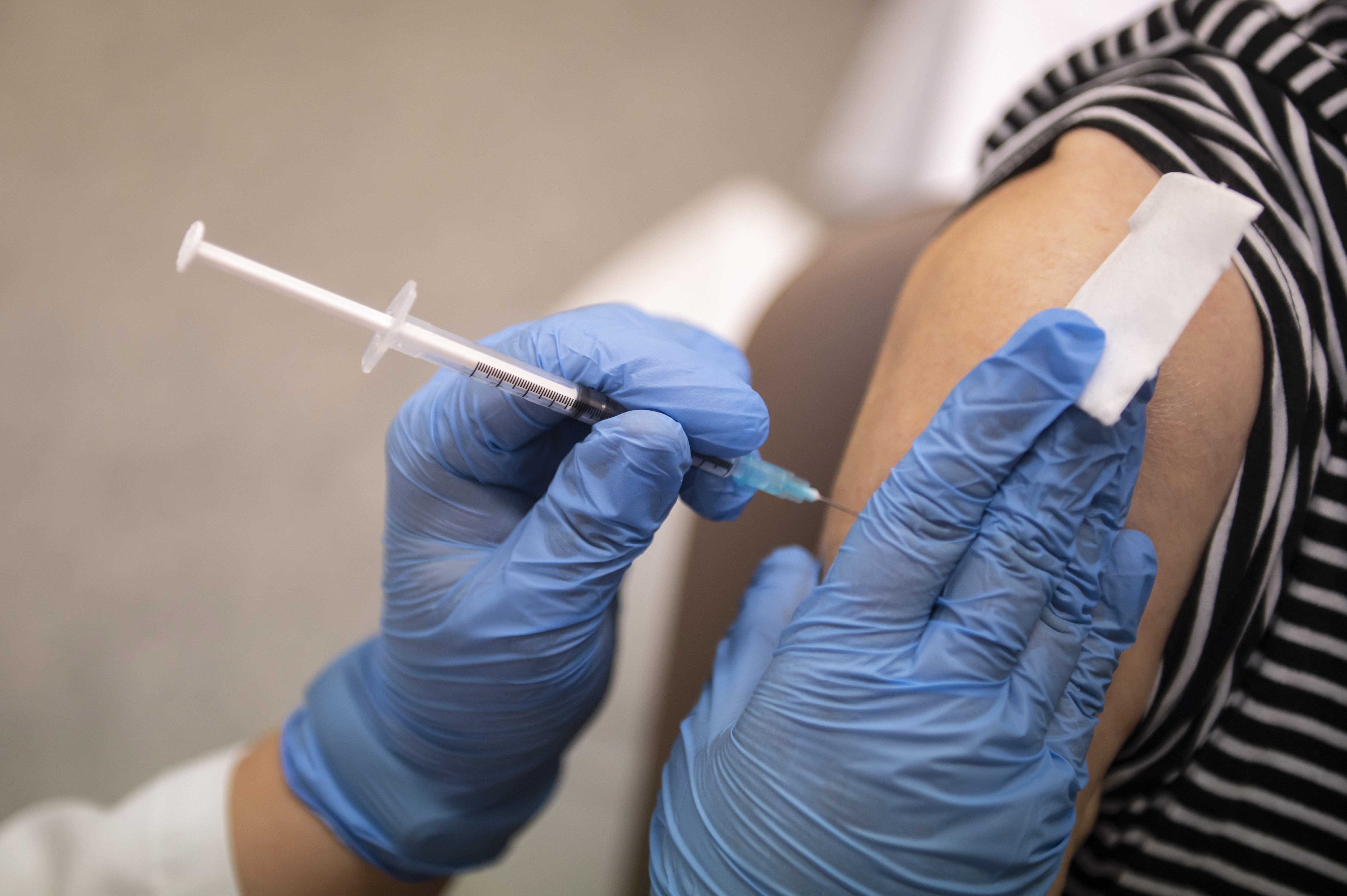Fourth Wave Restrictions Kick-in

A woman receives the third booster dose of the German-American Pfizer-BioNTech Comirnaty coronavirus vaccine at the Ferenc Markhot Hospital in Eger on Dec. 1, 2021.
Photo by Péter Komka / MTI.
As the number of infections continues to rise during the fourth wave of the coronavirus pandemic, the government once again started requiring people to wear facemasks in indoor public spaces from Nov. 20.
During a weekly press conference on Nov. 18, Gergely Gulyás, the head of the Prime Minister’s Office, said masks would be required in shops, museums, cinemas and theaters, and at service providers where more than five people are present.
Decisions on whether to insist on masks in schools would be left up to headteachers, while booster shots will be made mandatory in the healthcare sector, he added.
Additionally, the government submitted a proposal to Parliament on Nov. 23 to extend the effect of government decrees issued by the government under a state of emergency due to the coronavirus crisis until June 1, 2022, according to the state news agency MTI. Back on Sep. 27, MPs had decided to extend the effect of the legal provisions until Jan. 1, 2022, with a vote of 112 for, 25 against and no abstentions.
Meanwhile, chief medical officer Dr. Cecília Müller told TV news channel M1 that vaccination against the coronavirus has never been more necessary than it is now, describing the current predicament as “a race against time.” Müller stressed that the rising number of people becoming infected and an increasing amount going to the hospital demonstrates that we are in the fourth wave of the epidemic. While noting that the vaccine does not protect 100% from the infection, she said that it does prevent a serious course of the disease requiring hospitalization.
To further that end, the government organized a vaccination action week from Nov. 22-28. During that period, anyone could visit any of 101 participating hospitals or inoculation centers to get vaccinated between 7 a.m. and 7 p.m., without registering or making an appointment.
According to the head of the epidemiology department of the National Public Health Center (NKK) Ágnes Galgóczi, some 388,000 Hungarians got jabs of COVID vaccine during the first three days of a week-long inoculation drive, a figure that eventually amounted to 742,000 by the end.
Pivotal Significance
The campaign proved so successful the government decided to extend an inoculation drive by another week, Prime Minister Viktor Orbán said in a weekly interview on Kossuth Rádió on Nov. 26. While conceding that “few” people had gotten their first COVID jab during the drive, he praised the fact that “very many” had gotten their booster jabs, saying it was of “pivotal significance” ahead of the holidays.
At an annual hearing of the parliamentary economic committee, cabinet chief Antal Rogán said the government is planning further vaccination drives in December and January, as well as targeted campaigns in cooperation with health authorities to encourage as many people as possible to take up the booster jab.
Booster jabs could be coming just in time in light of a new COVID variant raising alarm globally. On Nov. 26, the Council of the European Union discussed possible EU responses to the newly identified B.1.1.529 variant, dubbed Omicron. In line with the ultimate decision, Hungary decided to restrict air traffic and deny entry of people from the southern African region while quarantining Hungarians returning from there.
As of Nov. 28, the National Center for Public Health (NNK) said it had not yet detected Omicron in the samples present in Hungary. However, NNK acknowledged that it had appeared in the “immediate neighborhood” in Austria, the Czech Republic, Germany and Italy over the weekend. According to the World Health Organization, there is an increased risk of re-infection with this Omicron compared to previous novel variants of the coronavirus.
This article was first published in the Budapest Business Journal print issue of December 3, 2021.
SUPPORT THE BUDAPEST BUSINESS JOURNAL
Producing journalism that is worthy of the name is a costly business. For 27 years, the publishers, editors and reporters of the Budapest Business Journal have striven to bring you business news that works, information that you can trust, that is factual, accurate and presented without fear or favor.
Newspaper organizations across the globe have struggled to find a business model that allows them to continue to excel, without compromising their ability to perform. Most recently, some have experimented with the idea of involving their most important stakeholders, their readers.
We would like to offer that same opportunity to our readers. We would like to invite you to help us deliver the quality business journalism you require. Hit our Support the BBJ button and you can choose the how much and how often you send us your contributions.








